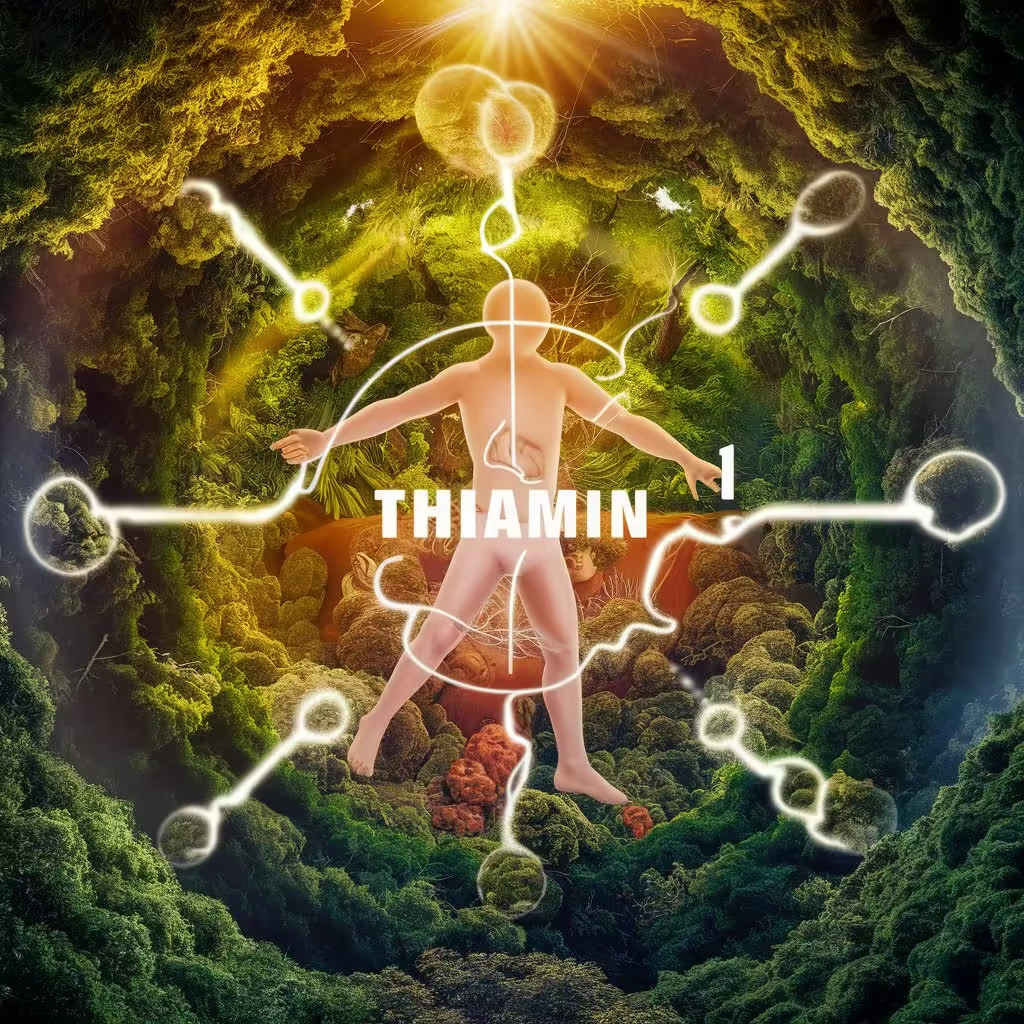
Vitamin B1 Benifits
Presentation
In our quest for optimal health, vitamin B1 benifits, and vitamins play a crucial role, acting as essential nutrients that our bodies need to function correctly. Among these, Vitamin B1, also known as thiamine, stands out for its significant impact on overall health. Whether it’s maintaining energy levels, supporting mental function, or ensuring a healthy cardiovascular system, Vitamin B1 is indispensable.

Significance of Nutrients in Everyday Well-being
Vitamins are vital for various bodily functions. Vitamin B1, in particular, is essential for converting nutrients into energy and supporting the nervous and muscular systems. Read more about Vitamin B1 natural sources…
What is Vitamin B1?
Vitamin B1, or thiamine, is a water-soluble vitamin that is essential for the B-vitamin complex. It plays a crucial role in converting nutrients into energy. The chemical structure of thiamine includes a pyrimidine ring and a thiazole ring, which are important for its biological activity.
Natural Sources of Vitamin B1
Vitamin B1 can be found in numerous foods. Whole grains, pork, fish, seeds, nuts, and legumes are excellent sources. Fortified foods, such as cereals and bread, also contribute significantly to dietary thiamine intake.
The Role of Vitamin B1 in the Body
Energy Production
Thiamine is vital for energy metabolism. It helps convert carbohydrates into glucose, which the body uses for energy. This process is essential for maintaining stamina and overall energy levels throughout the day.
Nerve Function
Thiamine plays a critical role in the proper functioning of the nervous system. It is involved in the synthesis of acetylcholine, a neurotransmitter that is essential for memory and learning.
Muscle Function
Thiamine contributes to muscle function by supporting the nervous system and energy production, ensuring muscles can contract and function properly.
Health Benefits of Vitamin B1
Boosting Energy Levels
Thiamine aids in the efficient conversion of food into energy, preventing fatigue and supporting endurance.
Enhancing Cognitive Function
Adequate thiamine levels are linked to improved cognitive performance, including better memory and learning abilities.
Supporting Cardiovascular Health
Thiamine supports heart health by aiding the production of ATP (adenosine triphosphate), the energy currency of cells, ensuring the heart has sufficient energy to function effectively.
Vitamin B1 and Mental Health
Reducing Anxiety and Depression
Research suggests that thiamine may help reduce symptoms of anxiety and depression. It is thought to support the production of neurotransmitters that regulate mood.
Improving Mood
By supporting overall brain function and neurotransmitter synthesis, thiamine can contribute to a better mood and mental clarity.
Vitamin B1 and Physical Performance
Enhancing Athletic Performance
Athletes often benefit from thiamine supplementation as it aids in energy production and muscle function, improving overall performance.
Assisting with Muscle Recovery
Post-exercise, thiamine helps in muscle recovery by facilitating energy replenishment and reducing muscle soreness.
Daily Recommended Intake of Vitamin B1
Age and Gender Considerations
The recommended daily intake of thiamine varies by age and gender. Adult men typically require 1.2 mg per day, while women need 1.1 mg. During pregnancy and lactation, the requirement increases to 1.4 mg per day.
Special Populations
Certain groups, such as pregnant women and the elderly, have higher thiamine needs due to increased metabolic demands and potential absorption issues.
Signs and Symptoms of Vitamin B1 Deficiency
Early Symptoms
Early signs of deficiency include fatigue, irritability, poor memory, and loss of appetite.
Severe Deficiency and Associated Conditions
Severe thiamine deficiency can lead to serious conditions such as beriberi and Wernicke-Korsakoff syndrome, which affect the cardiovascular and nervous systems, respectively.
Causes of Vitamin B1 Deficiency
Poor Diet
A diet low in whole grains, meat, and other thiamine-rich foods can lead to deficiency.
Chronic Alcoholism
Alcoholism interferes with thiamine absorption and storage, significantly increasing the risk of deficiency.
Certain Medical Conditions
Conditions like Crohn’s disease and anorexia, and treatments like dialysis, can also impair thiamine absorption.
Diagnosing Vitamin B1 Deficiency
Laboratory Tests
Blood and urine tests can determine thiamine levels in the body.
Physical Examination
Doctors may look for clinical signs of deficiency, such as changes in mental status or cardiovascular symptoms.
Treating Vitamin B1 Deficiency
Dietary Changes
Increasing the intake of thiamine-rich foods can help correct mild deficiencies.
Supplements
Thiamine supplements are available in various forms, including tablets and injections, and can quickly restore normal levels.
Preventing Vitamin B1 Deficiency
Balanced Diet
Consuming a diet rich in whole grains, meat, and fortified foods can prevent deficiency.
Regular Monitoring
People at risk of deficiency should regularly monitor their thiamine levels through medical check-ups.
Vitamin B1 Supplements
Types of Supplements
Thiamine supplements come in various forms, including thiamine hydrochloride and thiamine mononitrate.
Choosing the Right Supplement
Consulting a healthcare provider can help determine the most appropriate type and dosage of thiamine supplement.
Potential Side Effects of Vitamin B1
Overconsumption
While thiamine is generally safe, excessive intake can lead to side effects such as insomnia, irritability, and allergic reactions.
Allergic Reactions
Some individuals may experience allergic reactions to thiamine supplements, manifesting as itching, hives, or swelling.
Conclusion
Vitamin B1 (thiamine) is an essential nutrient that supports various bodily functions, from energy production to cognitive and cardiovascular health. Ensuring adequate intake through diet and, if necessary, supplements can help maintain overall health and prevent deficiency-related issues.
FAQs
How can I ensure I’m getting enough Vitamin B1? Incorporate a variety of thiamine-rich foods into your diet, such as whole grains, pork, fish, and legumes. If necessary, consider taking a supplement after consulting with a healthcare provider.
Can Vitamin B1 help with weight loss? While Vitamin B1 itself isn’t directly linked to weight loss, it maintains energy levels, which can support a more active lifestyle and healthier eating habits.
Is Vitamin B1 safe for children? Yes, Vitamin B1 is safe for children when consumed in appropriate amounts. The recommended daily intake varies by age, so it’s important to consult with a pediatrician.
How quickly do Vitamin B1 supplements work? The effects of Vitamin B1 supplements can vary, but improvements in energy levels and reduction in deficiency symptoms are often noticeable within a few weeks.

Leave a Reply